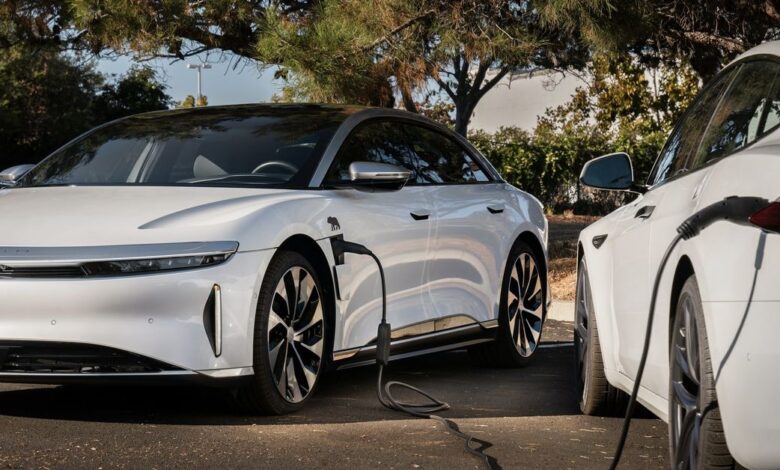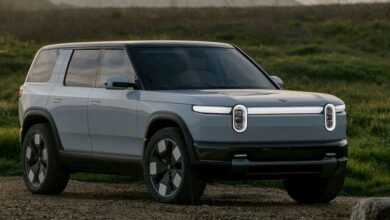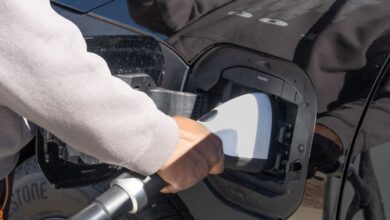What Rivian, Lucid, and Fisker tell us about the current state of EVs

It’s earnings season, and anyone invested in the idea that electric vehicles are the future of transportation is all over Tesla. But Elon Musk’s company isn’t the only one putting all its bets on battery-electric vehicles. Three other so-called “pure EV plays” — Rivian, Lucid Motors, and Fisker — also posted their earnings this week. And sifting through the numbers reveals some worrisome trends.
For years, it was assumed that Tesla as well as the dozen or so other pure EV companies it helped spawn, would outmaneuver the legacy automakers thanks to a laser focus on electric powertrains and battery production. But today, it’s the legacy automakers that are posting healthy profits while the pure EV companies flounder.
Price cuts, politics, and a stubborn belief that charging an EV is still too hard is holding a lot of people back. And the Tesla imitators are taking it square on the chin. Rivian, Lucid, and Fisker all appear to be in various stages of emergency. Let’s start with the most endangered and go from there.
Photo by Sean O’Kane / The Verge
Fisker
Henrik Fisker’s second attempt at building a car company from scratch appears on the same downward trajectory as his first.
The latest news comes not from the company itself but from the contract manufacturer that makes Fisker’s only model, the Fisker Ocean SUV. The contractor, Magna International, published its earnings this week in which it basically wipes its hands of Fisker by stating that it won’t be making any more Oceans for the struggling company.
“Our current Outlook assumes no further production of the Fisker Ocean.”
“Our current Outlook assumes no further production of the Fisker Ocean,” Magna says. Moreover, the company is facing $75 million in losses based on its relationship with Fisker.
On top of all of that, Fisker’s Austrian subsidiary filed for restructuring, which is roughly equivalent to filing for Chapter 11 bankruptcy. In its most recent filing with the US Securities and Exchange Commission, the company said it only had $50 million left in the bank.
Fisker was already on the ropes, but this could be the kill shot. The struggling EV company previously slashed the price of the Ocean by nearly 40 percent as it looks for a miracle to avoid going out of business. It’s facing a $13 million lawsuit from the firm that developed Fisker’s Pear crossover and Alaska pickup truck. And the company was recently delisted from the New York Stock Exchange for failure to keep its share price above $1.
With no EV, dwindling cash funds, and an exodus from the public markets, Fisker is running out of options.
Rivian
Everyone’s favorite outdoorsy EV company is facing a serious cash crunch. The company lost $1.45 billion in the first quarter of 2024, up from a $1.35 billion loss in Q1 of 2023 — which is a staggering level of cash burn.
Fortunately, it has $7.9 billion of cash and cash equivalents on hand, but it acknowledges that further cuts will be necessary if it’s ever going to achieve stability. Rivian has already gone through several rounds of layoffs in its short history, but it’s possible more could be on the horizon.
Everyone’s favorite outdoorsy EV company is facing a serious cash crunch
The good news is that a lot of key indicators are trending upward: production increased 48 percent year over year; deliveries are up over 70 percent; and revenue increased over 80 percent.
The company says its outlook remains strong thanks to several decisions to reduce capital expenditures by moving production of the next-gen R2 vehicles to its Normal, Illinois, facility. Once it’s finished retooling the factory, Rivian says it will have enough space to build 215,000 vehicles annually, including 155,000 R2s — which seems wildly optimistic considering the current state of customer demand for EVs.
Still, Rivian finds itself stuck in the “EV valley of death,” in which it has scaled up production but isn’t bringing in enough revenue to cover its operational costs. It’s an especially vulnerable place for a young company to be. And Rivian lacks a financial benefactor with bottomless pockets like Lucid has with Saudi Arabia’s Public Investment Fund.
Photo by Tim Stevens for The Verge
Lucid
Speaking of, the luxury EV marque doesn’t produce as many vehicles as Rivian, so it lost considerably less money this past quarter. Lucid brought in $172 million in the first three months of the year, a 15 percent increase year over year. It lost $680.9 million, down from $779.5 million lost in Q1 of 2023. As such, it is sitting on a $2.2 billion pile of cash (and cash equivalents).
But the price war with Tesla and others has taken a toll. Lucid has been slashing its prices, most recently by as much as $7,000 for its Air Pure sedan with rear-wheel drive. And the luxury EV maker has struggled to generate demand for its premium-priced vehicles, producing only 8,428 vehicles in 2023, of which only 6,001 were delivered to customers. Lucid also laid off 18 percent of its workforce and cut production targets multiple times.
Still, having the vast wealth of the Saudi Public Investment Fund in its back pocket has paid dividends. Weeks before releasing its earnings report, Lucid said it’s raising an additional $1 billion from the fund, sending its shares to their highest level in months.
The Public Investment Fund already owns a controlling stake, 60 percent, of Lucid, which illustrates the automaker’s strategic advantage over its struggling competitors. They will all continue to lose money in the near term as Tesla continues to wage a grueling price war and customers continue to waffle over when and how to make the switch to EVs. But while Rivian bleeds money and Fisker flirts with bankruptcy, Lucid can keep zooming ahead.



